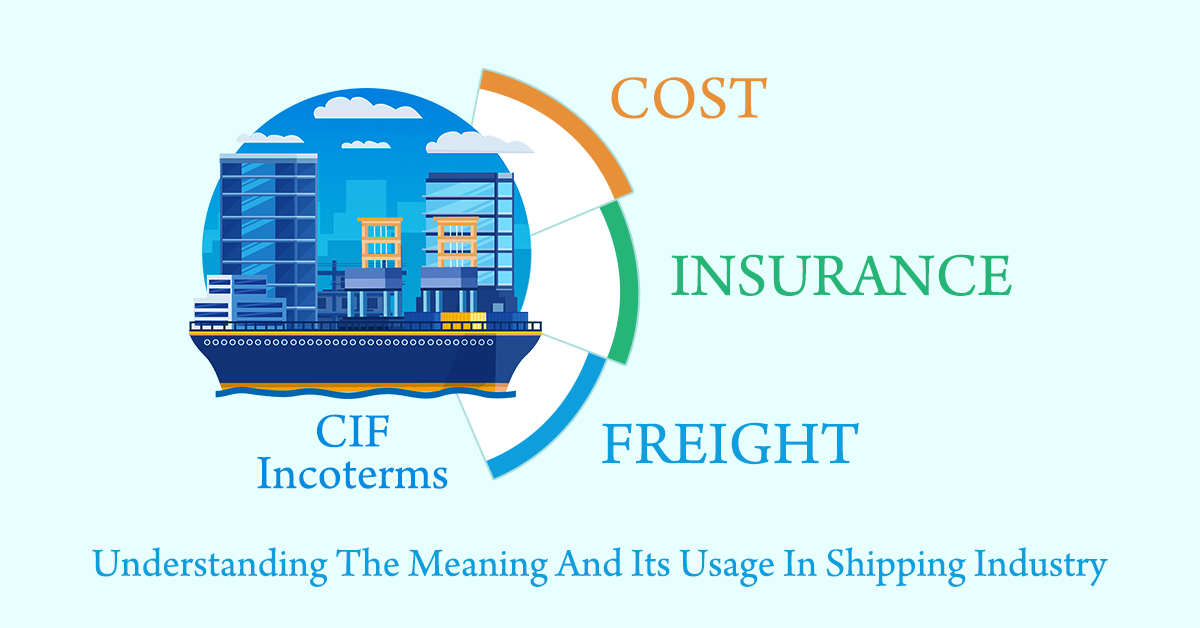CIF Incoterms- Its Meaning And Usage In The Shipping Industry
According to Incoterms 2020, CIF or “Cost, Insurance and Freight” is a term specific to maritime shipping.
With CIF, the responsibility and cost of loading the goods on the ship and bringing it to the destination of the buyer is of the seller. When merchandise is loaded onto the ship, the CIF risk transfer occurs.

It is recommended in situations like bulk shipping, where the seller can have direct access to the ship. CIF is not suitable for containerized cargo.
It is advisable to know the different CIF shipping terms.
Updates to CIF from Incoterms 2020
The rules set for CIF date back to when international trade began. They are largely unchanged since then. In Incoterms 2020, the buyer is responsible for the risks associated with damage or loss at delivery of the goods under CIF incoterms.
The Seller, on the other hand, is responsible for the risks by taking out insurance and then providing the documents to the buyer. This enables the buyer to claim should anything go wrong.
CIF shipping terms:
- Risks and costs
For the buyer
Once the shipment is loaded onto the vessel the risks related to the shipment are passed to the buyer. The responsibility to unload the goods from the ship once it reaches the port of destination is the responsibility of the buyer.
The buyer must pay the expenses for offloading and moving the goods inland from the port. The expenses for importing goods to the destination country is the responsibility of the buyer.
For the seller
The seller must arrange and pay for the transportation expenses to reach the cargo to the port of destination. The export administration is also the responsibility of the seller.
The seller must pay for the insurance and transportation of the cargo to the port of destination. The risks associated with the movement of the cargo are transferred to the buyer once the shipment is loaded onto the ship. The export costs related to the shipment are the seller’s responsibility.
- CIF insurance
The seller has the obligation to provide insurance for the goods transported on international waters under CIF. Conversely, buyers may more secure cargo insurance that offers better cover under the CFR Incoterm. With CFR, the buyer can take out their own insurance. There is no obligation on buyers to provide the insurance as there is in the case of CIF.
Download Book Now

- CIF freight
In the case of CIF Incoterms, the seller arranges the contract of carriage at their own expense. As a result, the seller has the right to use the service contract and pay off the freight expenses beforehand. The agreement made between the buyer and the seller generally ends at the feeder port, which may be in the same or another country, or at the port of the destination country. This type of agreement does not include the movement of the goods inland.
The seller must provide a transport document to the buyer as per the CIF agreement. This type of document works as the bill of lading, stating that delivery has been made. It is also proof of the discontinuation of risk.
Wherever possible, it is advisable to try to ensure that the requirements of the documentary credit terms are adhered to by a bill of lading.
How CIF Incoterm is used in the shipping industry & how it works:
CIF obliges the seller to organize everything needed to move the cargo from a destination to another. The destination is mutually agreed upon by the seller and the buyer.
As Incoterm CIF is applicable only for waterway transportation, it is important to ensure that the destinations can be reached by water.
- The seller has certain obligations under the CIF. They typically include: Getting into contracts with different carriers regarding the use of carriage
- Taking care of formalities related to export customs clearance
- Taking out and paying for cargo insurance
- Arranging the transportation of the goods from a destination to another paying these costs All the administration related to the cargo including special documentation, quotas, export permits, etc.
- Loading and unloading expenses of the cargo.
In this scenario, the risks are passed on to the buyer from the seller once the cargo is delivered. The expenses related to delivering the cargo at the destination must be covered by the seller. It is the duty of the seller to ensure that the insurance cover includes 110% of the complete commercial value of the goods.
- The buyer has certain obligations under the CIF. They typically include: Until the seller delivers the cargo on the ship the risks associated with the cargo are covered by the buyer.
- Taking care of the ship’s movement beyond the agreed destination.
- Managespecial documentation, quotas, import permits, etc.
- Responsibility for import customs clearance.
Summary
Understanding CIF shipping terms is important to know more about the relationship and responsibilities shared by buyer and seller in international trade.
Popular Post Like This
| BANK BORROWING | TRADE CREDEBT® | |
|---|---|---|
| No personal guarantees * | ||
| No liens/debentures * | ||
| Quick application | ||
| Quick decision | ||
| Commercial perspective | ||
| Consultative process | ||
| No credit limits | ||
| Light on administration | ||
| Quick access to cash | ||
| No exit fees * |
